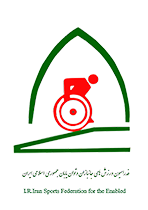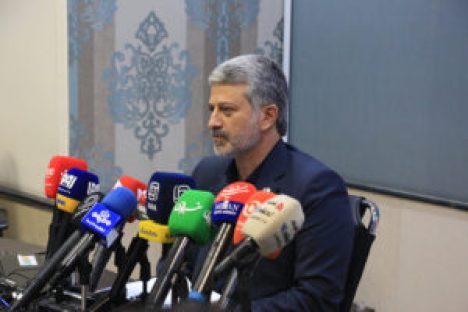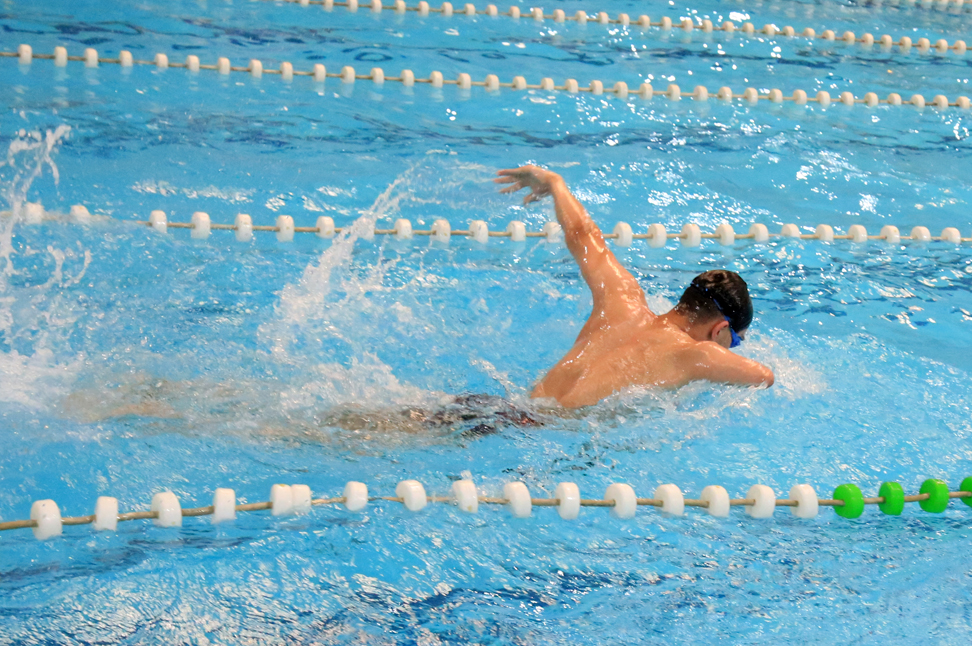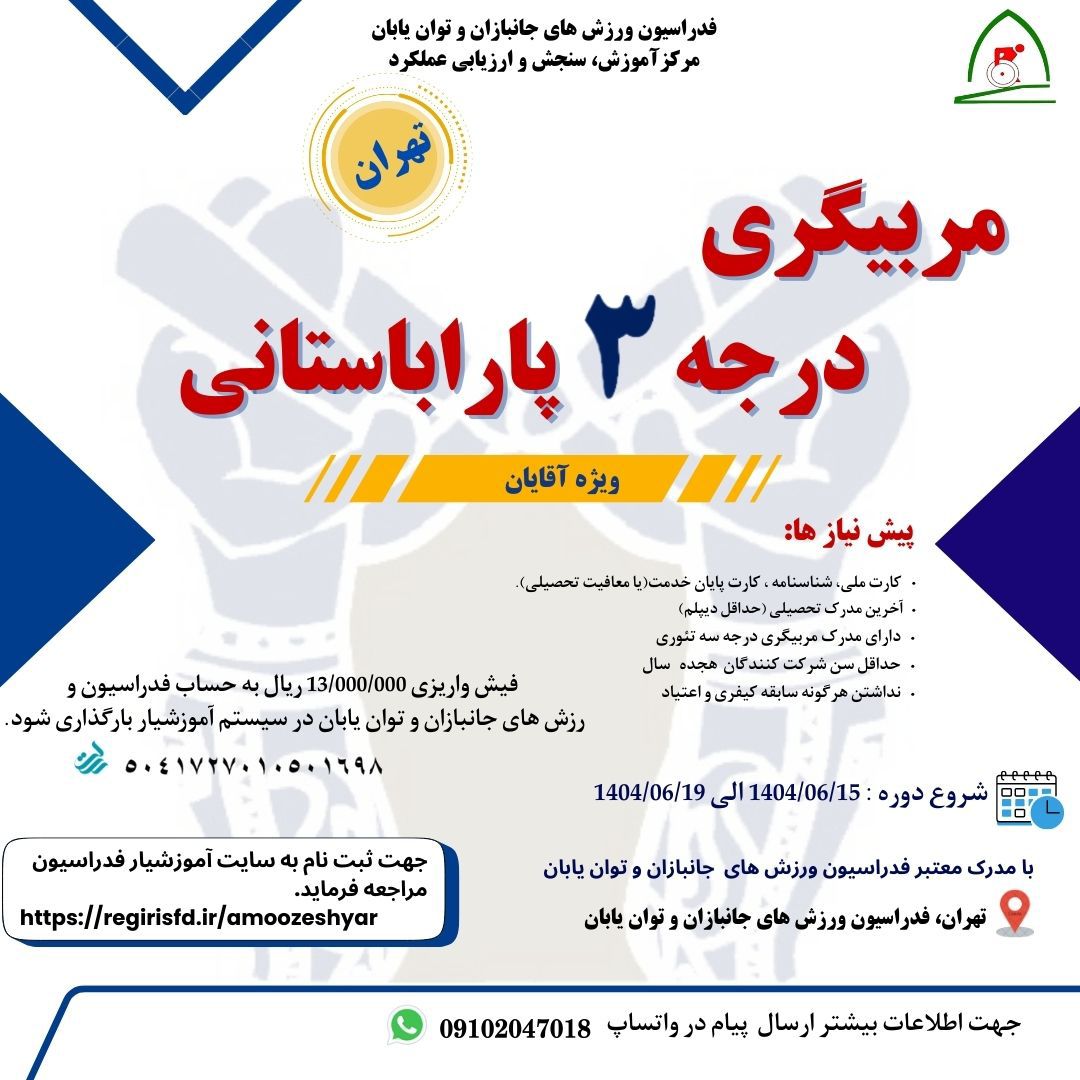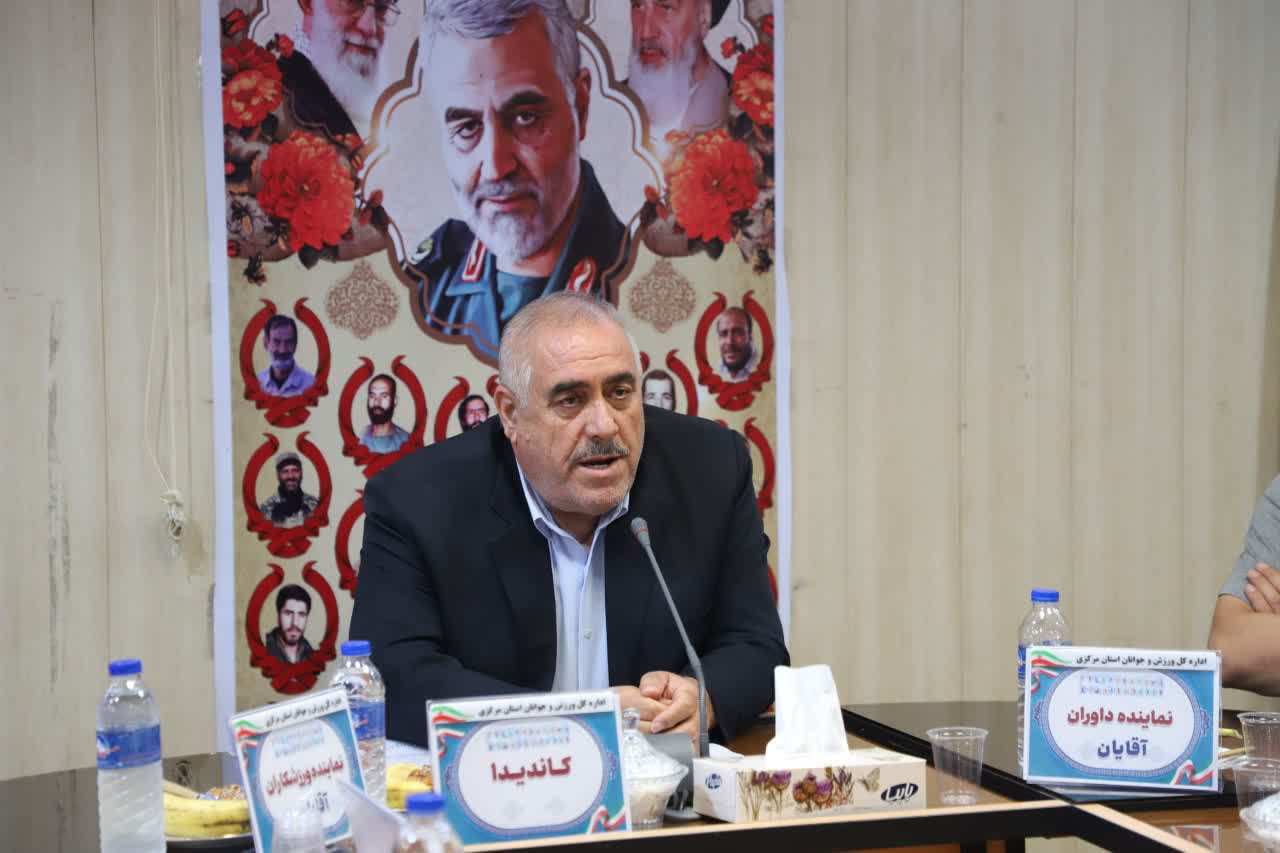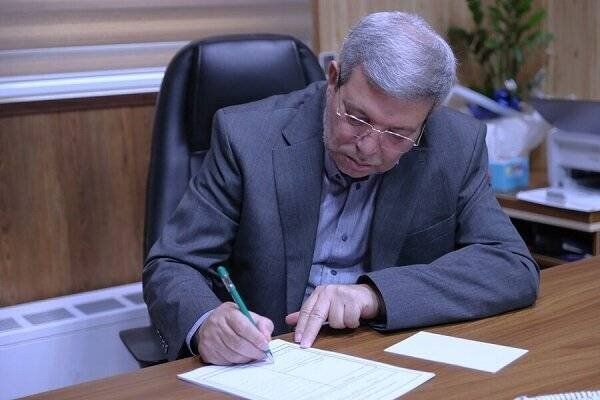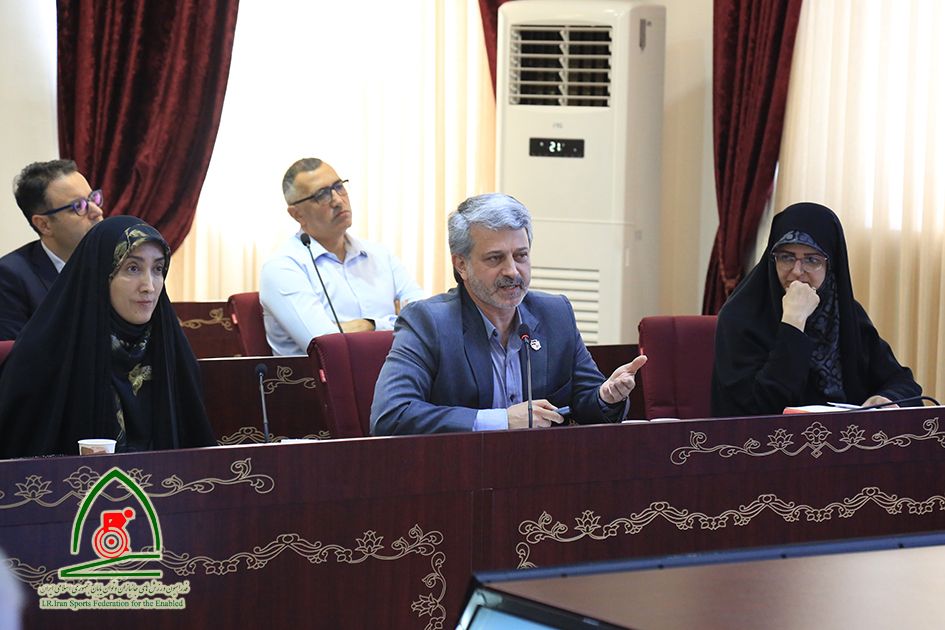The press conference of Dr. Jalil Koohpayeh Zadeh, President of the Federation, was held on Wednesday, August 6, 2025 (15 Mordad 1404), coinciding with Journalist’s Day, with the participation of media representatives from across the country in person and via webinar at the federation headquarters and 31 provincial veterans and disabled sports offices.
According to the Public Relations office of the Federation, Dr. Koohpayeh Zadeh began the conference by congratulating journalists on their day and emphasized:
“All our efforts are towards correct and constructive communication with the media because the media conveys all news about veterans and disabled sports activities to the community, which makes our mission heavier. Today, we have nearly six million audience members. Sports in the field of disabilities is family-oriented, and media can be effective in this area as well. The environment for inviting the target community to participate in sports is related to media activity.”
Reflecting Young National Teams’ News is a Necessity
He continued:
“After the Paralympic year, many sports began preparations last year for the next Paralympics. We also have an important youth program and hope you pay special attention to broadcasting the activities of our young generation. This year, the Para-Asian Games in the UAE will include competitions in 11 sports, in which our federation is represented in 8 sports. We must send young athletes to these games because youth are the main backbone of our Paralympic team. Iran’s delegation to the Para-Asian Youth Games competes in eight sports. For individuals with disabilities, entering sports is a heroic act, and those who come to sports are inherently champions and inspiring role models. Competition is an excuse for living healthily. National teams’ preparation camps for the UAE games started last August and continue. We will also participate in athletics and weightlifting at the Islamic Solidarity Games this November. Hopefully, we will perform well as we did in Konya, Turkey.”
Sport for People with Disabilities Is Inspirational
He stated:
“Competition in veterans and disabled sports is only an excuse. Disability sports are highly inspirational, giving individuals more motivation to live. Our sports discipline started activities in para-weightlifting, para-athletics, para-swimming, and para-arm wrestling since last year. With over three months remaining until the Para-Asian Youth Games, we aim to create the best conditions for achieving excellent results, building on our previous work.”
Talent Identification and Classification Have Been Integrated in Disability Sports
Dr. Koohpayeh Zadeh explained:
“In disability sports, talent identification and classification have merged. Ethnic and physical characteristics are important, but classification holds priority. The type and degree of disability in this sport must be determined. We have been pursuing integrating classification with regional, provincial, and national talent identification during the past year. The electronic data recording system started last year and with added measurement data, it will be suitable for initial talent identification. Once athletes enter the system, attention is paid to classification. Before relying on big slogans and artificial intelligence (AI), we must increase data recording.”
He added:
“During the past eight years, record-breaking in the Paralympics has grown remarkably, owing to the use of technology. We have technical knowledge, but we must upgrade technology and technical expertise to avoid lagging behind.”
Role Models and Financial Support Challenges
He noted:
“Disabled athletes inspire the community. Champions among disabled athletes display performances at world and Paralympic competitions that, regardless of gender, ethnicity, language, or country, serve as primary role models for other disabled individuals. One of our problems is finding financial supporters, but this is no reason to give up. We are striving through various means to attract supporters and have even reached out to philanthropists. We have also formed a Disabled Sports Philanthropists Assembly. We must eliminate the pity attitude toward veterans and disabled sports, empower them, and set them on the path to championships. One of the media’s missions is to introduce veterans and disabled sports to philanthropists and financial supporters.”
Training Talent Scout and Classifier Assistants in the Provinces
Dr. Koohpayeh Zadeh said:
“Our country is a leader in health systems. In rural health houses and comprehensive health centers, individuals with medical assistant or technician education work as intermediaries. To make services widespread and accessible, they must be affordable. If we expect classification at the international level to require doctors, physiotherapists, or PhDs in sports, we would have to wait a long time to find such people in rural areas. Therefore, we created a course for physical education experts to become classifiers or talent scouts by further education, naming it ‘Talent Scout and Classification Assistant.’ In each province, one man and one woman will be trained. The course is online, enabling them to evaluate talents identified in towns, provincial centers, and villages once. Then, at the regional level — with eight regional provincial centers identified — after initial talent identification and classification in the provinces, talents will be evaluated regionally. The eight regions help facilitate and reduce travel costs for athletes and their families. Our specialized teams verify the data every three months, continuously monitoring promising young athletes. After one year of data recording and entry into the software, artificial intelligence algorithms will assist us. Currently, software exists for talent identification in 35 sports for able-bodied individuals, but unfortunately, we lack both internal and external versions for disability sports. We intend to design an Iranian version with the help of experts, the scientific deputy of the presidency, academic institutions, and research companies.”
Need to Upgrade Coaches’ Knowledge and Use Technology
He emphasized:
“We must improve coaches’ knowledge. Records cannot be raised solely through training; technology use is essential. This applies to managers as well, who must move toward modern knowledge because our training is shifting toward technology. We aim to promote a culture of education in coming years.”
Promoting Disabled Sports and Its Achievements
Dr. Koohpayeh Zadeh said:
“I frequently hear from managers, ‘Introduce disability sports.’ We must consider the assets of veterans and disabled sports. I invite you to compete against boccia athletes to understand our athletes’ power. The capabilities of disabled sports athletes are visible. The impact of this sport on society is inspirational for many.”
Budget and Government Support
He remarked:
“We have tried to increase our budget numbers in the Plan Organization and parliamentary budget commission to enhance our sports. Our country is not poor and can better support disability sports. I appreciate Minister Danyamali’s special attention and hope future ministers act similarly. Whatever we invest in disability sports will yield returns multiple times greater than in other sports.”
Women’s Sport and Its Rapid Growth
Dr. Koohpayeh Zadeh said:
“Regarding women’s sports, we must show our support. In 2025, Iran ranked first globally in the fastest growth of women’s sports, but we still lag behind our goals. We only had 12 female representatives at the Paralympics who won medals, but we are seriously focused on this area.”
Attention to Intellectual Disability Sports
He added:
“The next concern is intellectual disabilities, which require more attention. Our intellectually disabled athletes have not played a major role, but it is commendable that mentally challenged football has grown and ranks among the top three teams worldwide. We must advocate so that, with support from Virtus Organization, we can send several intellectually disabled athletes to competitions. Virtus will hold competitions from 2026 to 2028, and we try to have our intellectually disabled athletes participate. We have requested the Ministry of Sports and Youth to establish a Virtus Games headquarters. Ignoring these athletes is unacceptable.”
Journalist Q&A Highlights
Regarding war veterans certified as disabled under the federation:
“According to statistics, 5,000 people were injured during the imposed war. Our definition of disability is permanent disability. Currently, there is no data available, but provinces have been instructed to identify such individuals. The first report will be provided by the end of the month.”
On the importance of the culture of AI usage:
“We use intelligent systems for talent identification and home exercises so athletes can train at home. There are over 6,000 exercise movements to develop home-based sports. The Byrozeness device can analyze 280,000 athlete movements. Other orders are underway, but the most important is promoting the culture of AI. Everyone should learn how to use AI.”
Access and equity for disabled athletes:
“We asked provincial offices to help, and with the Ministry of Interior’s Social Deputy, we are designing plans such as adapting sports spaces. We have rural facilities willing to activate disabled sections. The main problem is transportation, which is the municipalities’ responsibility. We have begun negotiations to implement accessibility for the disabled. We are in talks with any network willing to help.”
Infrastructure and challenges with provincial managers:
“One of our actions is ensuring no distance exists among our national athletes and that all share national resources. Disabled athletes must not face closed doors. We must care about athletes’ livelihood outside sports. Paralympic champions deserve the same facilities as Olympic champions. We must amend laws. While laws state jobs should be given to disabled athletes’ families, jobs should be given to the athletes themselves. The parliament and government should help solve these issues. Able athletes can work; they must not suffer economic or housing problems. Our provincial bodies should use all capacities to support the disabled. It’s a multidimensional puzzle, and all pieces must be arranged to assist athletes.”
Sitting Volleyball Challenges and Plans
Dr. Koohpayeh Zadeh said:
“Sitting volleyball is a national and international pride. Currently, we have two teams preparing for the Nagoya Asian Games and Los Angeles events. Nagoya team was meant to compete in Asia-Oceania Championships and Los Angeles team in the Netherlands tournament. However, Nagoya team, being newly formed, did not participate in Asia-Oceania. The Netherlands tournament was canceled due to the war for the Los Angeles team. For the US, it was decided that non-critical events would be removed from the schedule.”
In response to a question about the cancellation of the World Cup in the US and its 1000 points affecting Iran’s ranking, he said:
“Our ranking situation is good. We will participate in other competitions. The Netherlands was canceled although players’ visas were being issued. We will try to attend the earliest possible event.”
Regarding how war cancellations impacted their federation’s dispatches, he stated:
“Five international events have been canceled so far, none critical. Our first upcoming dispatch is for the boccia discipline.”
Importance of Rehabilitation
The federation president highlighted:
“Due to the serious need of veterans and disabled athletes for rehabilitation and health monitoring, effective actions are underway to expand health equity for these athletes in disadvantaged areas. A memorandum has been signed with the Ministry of Interior’s Social Deputy to use the federation’s national network and the Ministry’s support to deploy sports as a tool to reduce social harm in the disabled community. Also, with thousands of active sports houses in villages, the federation will leverage these centers to improve access to specialized services in the future.”
Expanding Sports Services and Urban Accessibility
Dr. Koohpayeh Zadeh stated:
“To expand sports services for all community segments, negotiations with the Ministry of Sports under the national ‘Sports and People’ plan are ongoing to activate disability sports. Initial measures started at the county level, but beyond financial capacity, the main challenge is transportation and insufficient urban accessibility infrastructure, such as public transport, wheelchair movement on sidewalks, and blind people’s access in urban areas.”
He concluded:
“A memorandum will be signed with the Supreme Council of Provinces to utilize the extensive network of city and village councils, in cooperation with the Ministry of Interior and related bodies, to prepare urban spaces accessible to disabled people under the guise of sports. This is currently in the agreement and preparation stage so that this part of society’s voice is heard.”

